Fall In Love with Arborio Rice Bread from Della Fattoria
I am madly, deeply, crazy as a loon in love.
With this bread.
It’s a solid loaf. It has a beguiling character owing to an unusual backbone of arborio rice. It has every quality you’ve dreamed about in the perfect bread. In short, it’s a keeper.
And I was smitten at the first chewy bite.
Naturally, the recipe comes from one of my favorite bread bakeries — Della Fattoria in Petaluma, where owner Kathleen Weber and her family turn out artisan loaves baked in a wood-fired oven on their ranch. They are breads full of flavor and integrity. Among the first restaurants they supplied was the French Laundry in Yountville, which tells you just how extraordinary the products are.
“Arborio Rice Bread” is from their new cookbook, “Della Fattoria Bread” (Artisan), complete with 63 recipes for everything from Della Fattoria’s signature Meyer Lemon-Rosemary Campagne Boule to Spicy Cheddar Crackers to Sticky Buns.
It appealed to me for its intriguing use of risotto-style rice and because it’s one of the more streamlined recipes in the book as it doesn’t require a starter.
Making bread always takes time and patience. It’s never a quick process. But this particular recipe doesn’t require much heavy-lifting. It also makes two loaves, so you’re amply rewarded after an afternoon of work.
Once you incorporate the cooked arborio rice, the dough takes on a lumpy quality resembling loose cottage cheese.
The book gives a rather detailed, elaborate method for forming batard-shaped loaves for the pans. But truth be told, I found the dough so sticky that it was easier to just cut the dough in half with a bench scraper, then push the mass into each pan, before smoothing the top. They baked up just fine that way, too. That’s why I’m not including them in the recipe below.
The loaves emerge with a delicate crispy exterior that reminds me a little of tahdig — the coveted layer of Persian rice that sticks to the pot and gets all golden and crunchy. If you are a fan of that like I am, you will go mad for this bread.
The interior is soft, chewy, even creamy. There’s a vague English muffin-like taste and texture to this bread with its variegated hills and valleys of soft and crisp.
When you toast slices, that becomes even more apparent. Indeed, this is one loaf where you will find yourself fighting for the end pieces because the crust is just that good.
Imagine that.
Arborio Rice Bread
(Makes 2 standard loaves)
For the rice:
3/4 cup (5.5 ounces or 158g) arborio rice
2 1/4 cups (18.5 ounces or 525g) water
For dough mix:
5 1/4 cups (26 ounces or 735g) all-purpose flour
1 tablespoon plus 3/4 teaspoon (0.5 ounce or 13g) instant yeast
1 tablespoon (0.6 ounce or 19g) fine gray salt
2 cups (16.5 ounces or 468g) water at room temperature (65- to 70-degrees F)
For the wash:
1 to 2 tablespoons (0.5 to 1.1 ounces or 14 to 32g) olive oil or milk or a combination of both
To cook the rice, combine the rice and water in a small saucepan and bring to a boil. Cover, turn the heat down to low, and cook until the water is absorbed and there are little holes across the surface of the rice, 15 to 20 minutes.
Remove the lid and let the rice cool slightly. The rice should still be very warm when incorporated with the other ingredients.
Lightly oil or spray a deep 4 1/4- to 5-quart ceramic or glass bread bowl. (The amount of dough for this bread will work well in a 3-quart bread bowl if you have one.)
In a large bowl, whisk together the flour, yeast, and salt.
When the rice is still very warm but cool enough to touch, mix it into the flour until the mixture has the texture of a gummy meal. Pour in the water and continue to mix with your hands, gently gathering the mixture together, turning it and pressing it with the heels of your hands, until it comes together. It will be very sticky, similar in texture to a milky biscuit dough; do not be surprised if you have quite a bit sticking to your hands.
Using a plastic bowl scraper, get what dough you can off your hands, pressing it back onto the dough, and turn the dough into the bread bowl. Cover the bowl with a lightly oiled or sprayed piece of plastic wrap and place in a warm, draft-free spot (for instance, inside your oven with the pilot light turned on) until the dough has at least doubled in volume and there are delicate bubbles across the surface, 1 1/2 to 2 hours.
Fairly generously oil or spray two 8 1/2-by-4 1/2-by-2 3/4-inch loaf pans.
Flour the work surface. turn out the dough, using the bowl scraper, and use a bench scraper to divide it in half. Roll or scrape each half into one of the loaf pans, smoothing the top and making sure there are no seams showing. Brush the tops of each loaf with the wash. Cover the tops with a lightly oiled or sprayed piece of plastic wrap. Set the pans in your warm spot to proof until the dough reaches the tops of the pans, 1 1/2 to 2 hours; remove the plastic wrap.
Meanwhile, position a rack in the lower third of the oven, set a baking stone on it, and preheat the oven to 450 degrees (removing the loaves beforehand if you used the oven for proofing).
When ready to bake, place the pans on the stone and immediately lower the oven temperature to 400 degrees. Bake for 30 to 35 minutes, or until the tops are a rich golden brown. The loaves will be delicate, but they can carefully be taken out of the pans to brown directly on the stone: place the loaves on the stone and let brown for about 3 minutes to brown the sides and bottom more evenly. To test for doneness, tap the bottom of the loaf. It should sound hollow. Otherwise, insert an instant-read thermometer into the center. It should register between 200 to 210 degrees F.
Transfer the bread to a cooling rack and let cool completely.
Store in a well-vented bread box. Or freeze by wrapping first in foil, then in a plastic bag. To defrost, unwrap it and leave it on the counter at room temperature.
Adapted from “Della Fattoria Bread” by Kathleen Weber
More Bread to Bake:Â English Muffin Bread in the Microwave
And: Raisin, Rosemary and Cinnamon Focaccia
And: Pane al Pomodoro (Tomato Bread)
And: Double Chocolate-Honey Bread

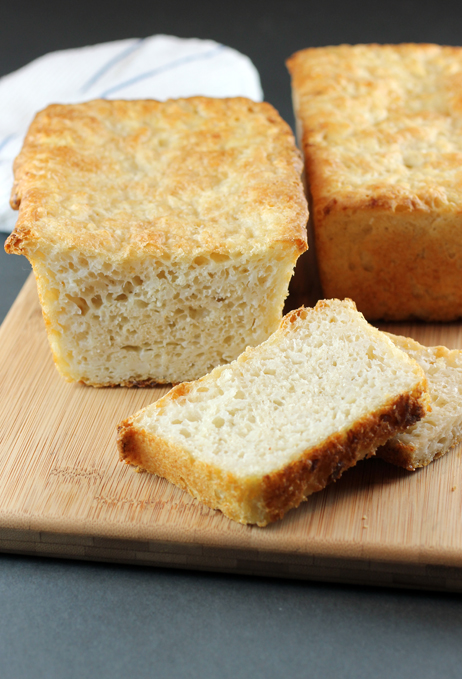
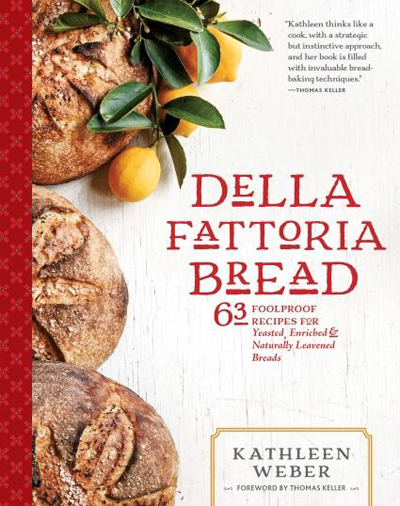
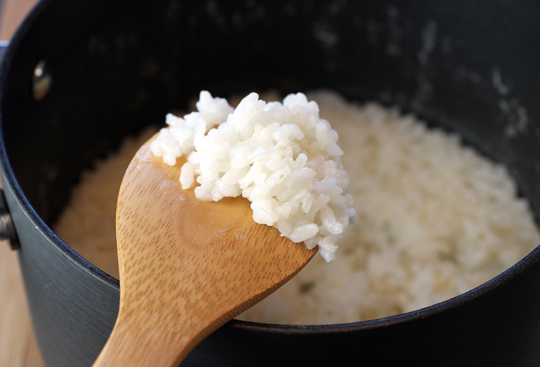
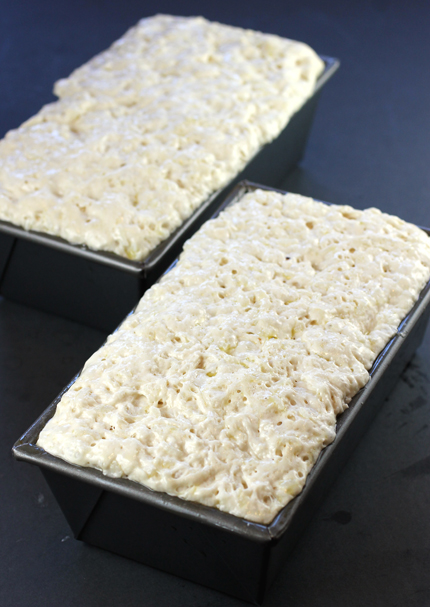
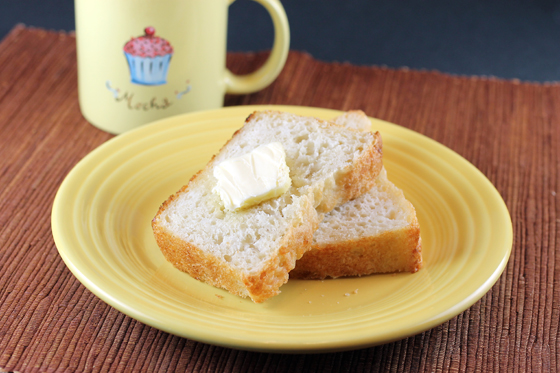
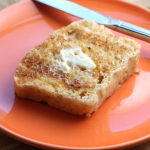
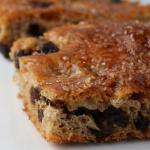
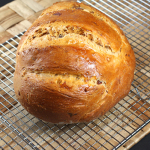
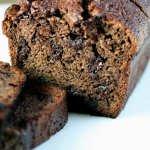
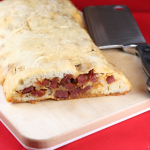
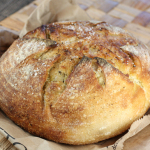
A very interesting bread! I want to try that recipe…
Cheers,
Rosa
What an interesting bread! We make bread all the time, but never used rice. But we will. 😉 Thanks.
“removing the loaves beforehand if you used the oven for proofing”
Fess up; you put that advice in just for me, did you not?
Much appreciated! 🙂
Never had rice bread before. This looks amazing!
I’m so going to make this Carolyn! I’m intrigued by the flavour of it! 😀
I’m baking from that book today! This bread looks so good. I have to try it next. The English-muffin like description sold me!
I am so excited to try this!!! I recently flipped through the cookbook and it looked amazing! I hope to get to their bakery one of these days! Your pictures are beautiful. So glad you posted this!!!